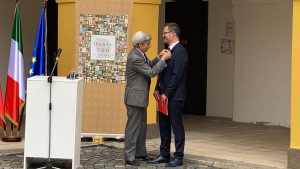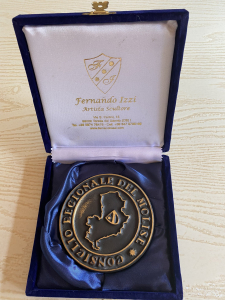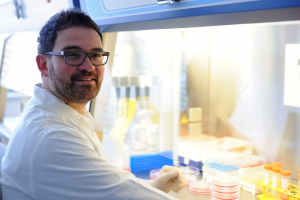Interview with Giancarlo Forte – recipient of the Order of the Italian Star
The second highest civilian award, the Order of the Italian Star, was awarded to an Italian scientist Giancarlo Forte this June. He received the award in recognition of his work and for representing Italy abroad. He is the head of the Center for Translational Medicine at the International Center for Clinical Research of the St. Anne’s University Hospital in Brno (FNUSA-ICRC), which he has built and has been working there for more than 8 years. In the past, he also lived and worked in Japan and Germany, but since 2013 he has been living with his wife in Brno, where their daughter was born in 2017.
When it comes to his research, he studies cardiovascular diseases, diseases of the brain and nervous system, immune system diseases and selected types of cancer. As a part of his research, he also works with stem cells that can regenerate tissues and thus represent a potential for the treatment of many diseases.
Was becoming a scientist always your dream, or did you have another career in mind?
When I was a kid, I wanted to become an archeologist. Because I had this dream of becoming Indiana Jones, but then with time, I developed an interest in natural sciences and biology. My decision to become a scientist was made in high school.
Previously you worked and lived abroad, why did you choose specifically Germany and Japan?
Usually, in science, you don’t choose that much as far as location is concerned because of the projects. Whenever you are working on a specific scientific project, you make sure that you choose the best place where this can be pursued. So Germany came as an offer after my Graduation, and I was interested in the offered project. So I decided to move there. With Japan, it was similar, but in that case, one of my mentors of the Ph.D. moved to japan, and he invited me to join for a while. During that period, I met a japanese professor who invited me to apply for a position, and that’s how I got the job in Japan. Moving around is basically driven by science and the specific programs that each place focuses on.
Were you always planning to work or live abroad?
No, I always had this idea of being a globetrotter, and I wanted to actually move abroad for a period of time. I just didn’t know how long this period would be. And then with science, you are told constantly that you should go to the best lab or to follow the project you are working on. And then it became natural. It’s kind of a natural part of the life of all scientists.
Out of all the places in the world, why did you choose Brno?
This was pure chance. Basically, after a few years in Japan, I decided I wanted to go back to Europe because of the earthquake, nuclear fallout, and tsunami. Those are the moments when you realize how far you are from Home. I started to look for a position, and then I found a possible position in this brand-new institute in Brno, and I simply took the challenge. I visited Brno, and I liked it immediately, so together with my wife, we decided that it was a good place to start fresh.
How different is Brno from other places where you have worked? Or is it the same everywhere?
No, it’s not the same everywhere. It’s completely the opposite of Japan. Since being in Japan feels like living upside down, Brno feels like going back to normality. European lifestyle is somehow homogenous, more homogenous than living in the far east or in the USA, so Brno is very close to our lifestyle. I think I just experienced the language shock, I was quite used to the European lifestyle, and Brno is quite a European city.
Is there something in Italy you miss now that you live in Brno?
We miss our family and friends. When you move around, you somehow feel closer to long-term friends. As we travel and move abroad, we are actually driven to value friendship and family more. Apart from that I also miss the weather and the food, but that’s something you can live with.
What does the award mean for those who receive it? And What does it mean to you specifically?
The award is a commendation by the president of the Italian republic, which is given to Italians but sometimes also foreigners who help represent the nation abroad. Even Though it is an old status, I was happy to see that probably for the first time, it was awarded to a scientist. Usually, most young italian scientists are forced to go abroad because there are no possibilities to work at home. I don’t think it’s bad, I decided to go on my own, and I never felt exiled. But for all Italian scientists who are abroad, it’s nice to hear that the president values our contribution even though we are not giving it directly to the country, but we are giving it to the country from abroad. So in my case, I felt that it was an appreciation of the work we have been doing. And it’s not just about me. It’s about the whole lab and the whole FNUSA-ICRC and what we have been doing to create an international environment and to make all the students and scientists who are traveling the world feel comfortable and like they are at home. We have many nationalities in the lab, and people are, as far as I know, happy to be there. We give them a chance, train them, and make sure they feel welcome.
What does your research focus on?
I specifically coordinate the center for translational medicine within the FNUSA-ICRC, where we do translational research. So we study and investigate the molecular basis of diseases affecting the cardiovascular system, diseases of the nervous system (brain and nervous system), diseases of the immune system, and some selected kinds of cancer. We basically try to bridge the clinical experience of the pathology itself, of the symptoms with the causes at the cell and tissue level.
What are your research plans or goals for the future, and are you planning to stay in Brno?
During these years, we have made some interesting contributions and discoveries about new possible mechanisms of pathologies both in cancer and in cardiovascular diseases, so we would like to investigate this further. The challenge here is to turn our knowledge of the mechanisms of disease into a cure. We would be happy to move a little closer to the clinics and the patients and try to understand how we can control these molecular processes to design some potential treatments. Obviously, I am dreaming here because the path to the clinics is very far for everybody, and it is clear to everybody that the path from translational science to the design of disease treatment is a very long one.
When it comes to moving abroad, that depends on many circumstances. It’s also true that scientists are globetrotters, and sooner or later, they need to find a new place. It’s possible that in the future, we will look for new challenges somewhere else, but for the time being, we are happy in Brno. We are happy with the possibilities we have to do research and express ourselves as scientists, and there is currently no plan we have for the far future.
Do you have any wild dreams or plans you have when it comes to research?
Most of the science is incremental. We try to take little steps in one direction, which are fueled not only by curiosity but also by the support of other colleagues. This knowledge builds up, and then, in the end, you reach something revolutionary, but most of the efforts are incremental. I definitely don’t plan a revolution. Revolutions in science are usually random, so they come just by chance.




